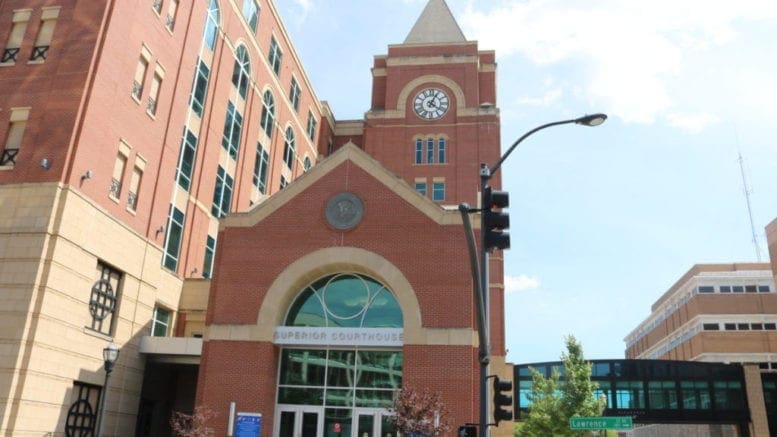Jamal Adams was sentenced to life plus 25 years to be served in confinement for the rape of a six-year-old child.
He was convicted on May 6, 2022 in Cobb County Superior Court in a jury trial presided over by Judge Anne B. Harris. The charges against him included rape, incest and two counts of aggravated child molestation.
A public information release from the office of Cobb County District Attorney Flynn Broady, Jr. described the incident leading up to the arrest and conviction as follows:
Adams’ charges stemmed from an outcry of sexual abuse made by a six-year-old child on June 3, 2020. The child was transported to the WellStar Cobb Hospital and injuries were identified in the child’s sexual assault exam. Cobb County Police Department began their investigation and SafePath completed a forensic interview. CCPD SVU Detective Ferruccio and Sergeant Drew interviewed Adams. Based on their investigation, Adams was arrested on June 4, 2020.
Adams was certified as indigent, so Marietta attorney Jason Treadaway was appointed to represent him during the trial.
According to the public information release:
The District Attorney’s trial team included Senior Assistant District Attorney Lindsay Raynor, Assistant District Attorney Kristen Judd, Investigator K. Huffman, Victim Advocate Crystal Gossett, and Legal Administrative Assistant Dawn Carter. At trial, Senior Assistant District Attorney Lindsay Raynor presented the testimony of the victim, family members, law enforcement, SafePath personnel, and medical evidence.
As she handed down the sentence on May 19, Judge Harris said she was not willing to risk Adams having an opportunity to molest another child.
“This child showed incredible bravery at a very young age by testifying in front of her abuser and the jury,” Senior Assistant District Attorney Raynor said. “Adams’ actions were unconscionable and despicable. We are confident with this sentence that Adams will never prey on another child again.”
What is Cobb County Superior Court?
In Georgia, the Superior Court is one of three trial courts found in each judicial circuit. The other two trial courts are State Courts and Probate Courts.
If you watch TV or movie courtroom dramas you’ll be familiar with the most high-profile role of the court. Superior Court in Georgia would be the court where a murder trial would be conducted.
So Superior Court conducts felony trials.
But it also handles a number of other types of case.
The Georgia Superior Courts website describes the varied functions as follows:
The Superior Courts of Georgia is a court of general jurisdiction handling both civil and criminal law actions. Superior Court Judges preside over cases involving misdemeanors, contract disputes, premises liability, and various other actions. In addition, the Superior Court has exclusive equity jurisdiction over all cases of divorce, title to land, and felonies involving jury trials, including death penalty cases.
How are Superior Court judges chosen?
Superior Court judges are elected for four-year terms in nonpartisan elections. If a judge resigns or retires the governor appoints a replacement to serve out the judge’s unexpired term.
The requirements to run for a Superior Court seat is that the candidate be at least thirty years old, has been a Georgia citizen for at least three years, and the candidate has practiced law for at least seven years.
What judges are currently on the Superior Court in Cobb County?
Cobb County has eleven Superior Court judges;
Robert D. Leonard II is the Chief Judge.
Two judges are retiring: Mary Staley Clark and Robert E. Flournoy III.
The election held to replace Judge Flournoy will be on May 24, and Judge Clark’s replacement will be appointed by Gov. Brian Kemp.
The other judges are:
Judge C. LaTain “Tain” Kell
Judge Gregory Poole
Judge Ann B. Harris
Judge Kimberly A. Childs
Judge Kellie S. Hill
Judge Angela Z. Brown
Judge Jason D. Marbutt
Judge Henry R. Thompson
How do I learn about Superior Court judges before elections?
Judicial races are among the most difficult races for the public to research, but the internet has made it easier.
For Cobb County judicial elections there are a number of media that cover the courts and candidates, including here at the Cobb County Courier, the Marietta Daily Journal, the Atlanta Journal Constitution, and East Cobb News.
For biographies of judicial candidates, you can also visit the campaign web pages of the candidates. Those biographies are of course written to put the candidate in the best light, but it’s a good starting point for determining the candidate’s educational and employment background.
To get a list of the candidates, visit the Georgia Secretary of State page for qualified candidate information at https://sos.ga.gov/qualifying-candidate-information
Superior Court is considered a state office, so you would select “State” on the Office Type pulldown menu, the General Primary/Special Election under the Election menu, and “Non Partisan” under the Party menu. Then under Offices scroll down the pulldown menu until you
